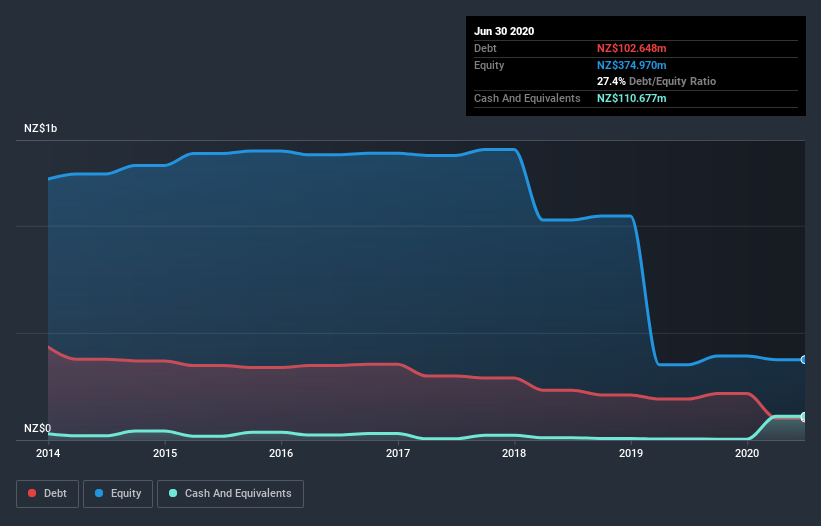Is SKY Network Television (NZSE:SKT) A Risky Investment?

Some say volatility, rather than debt, is the best way to think about risk as an investor, but Warren Buffett famously said that 'Volatility is far from synonymous with risk.' So it might be obvious that you need to consider debt, when you think about how risky any given stock is, because too much debt can sink a company. We can see that SKY Network Television Limited (NZSE:SKT) does use debt in its business. But should shareholders be worried about its use of debt?
What Risk Does Debt Bring?
Debt and other liabilities become risky for a business when it cannot easily fulfill those obligations, either with free cash flow or by raising capital at an attractive price. If things get really bad, the lenders can take control of the business. While that is not too common, we often do see indebted companies permanently diluting shareholders because lenders force them to raise capital at a distressed price. Having said that, the most common situation is where a company manages its debt reasonably well - and to its own advantage. When we examine debt levels, we first consider both cash and debt levels, together.
See our latest analysis for SKY Network Television
What Is SKY Network Television's Debt?
As you can see below, SKY Network Television had NZ$102.6m of debt at June 2020, down from NZ$191.3m a year prior. But on the other hand it also has NZ$110.7m in cash, leading to a NZ$8.03m net cash position.
How Healthy Is SKY Network Television's Balance Sheet?
The latest balance sheet data shows that SKY Network Television had liabilities of NZ$382.1m due within a year, and liabilities of NZ$80.9m falling due after that. Offsetting this, it had NZ$110.7m in cash and NZ$45.3m in receivables that were due within 12 months. So it has liabilities totalling NZ$307.0m more than its cash and near-term receivables, combined.
When you consider that this deficiency exceeds the company's NZ$270.7m market capitalization, you might well be inclined to review the balance sheet intently. Hypothetically, extremely heavy dilution would be required if the company were forced to pay down its liabilities by raising capital at the current share price. SKY Network Television boasts net cash, so it's fair to say it does not have a heavy debt load, even if it does have very significant liabilities, in total.
Importantly, SKY Network Television's EBIT fell a jaw-dropping 49% in the last twelve months. If that decline continues then paying off debt will be harder than selling foie gras at a vegan convention. When analysing debt levels, the balance sheet is the obvious place to start. But it is future earnings, more than anything, that will determine SKY Network Television's ability to maintain a healthy balance sheet going forward. So if you want to see what the professionals think, you might find this free report on analyst profit forecasts to be interesting.
Finally, a business needs free cash flow to pay off debt; accounting profits just don't cut it. SKY Network Television may have net cash on the balance sheet, but it is still interesting to look at how well the business converts its earnings before interest and tax (EBIT) to free cash flow, because that will influence both its need for, and its capacity to manage debt. During the last three years, SKY Network Television generated free cash flow amounting to a very robust 90% of its EBIT, more than we'd expect. That puts it in a very strong position to pay down debt.
Summing up
While SKY Network Television does have more liabilities than liquid assets, it also has net cash of NZ$8.03m. The cherry on top was that in converted 90% of that EBIT to free cash flow, bringing in NZ$101m. So while SKY Network Television does not have a great balance sheet, it's certainly not too bad. The balance sheet is clearly the area to focus on when you are analysing debt. But ultimately, every company can contain risks that exist outside of the balance sheet. Be aware that SKY Network Television is showing 1 warning sign in our investment analysis , you should know about...
At the end of the day, it's often better to focus on companies that are free from net debt. You can access our special list of such companies (all with a track record of profit growth). It's free.
This article by Simply Wall St is general in nature. It does not constitute a recommendation to buy or sell any stock, and does not take account of your objectives, or your financial situation. We aim to bring you long-term focused analysis driven by fundamental data. Note that our analysis may not factor in the latest price-sensitive company announcements or qualitative material. Simply Wall St has no position in any stocks mentioned.
Have feedback on this article? Concerned about the content? Get in touch with us directly. Alternatively, email editorial-team@simplywallst.com.

 Yahoo Finance
Yahoo Finance 
